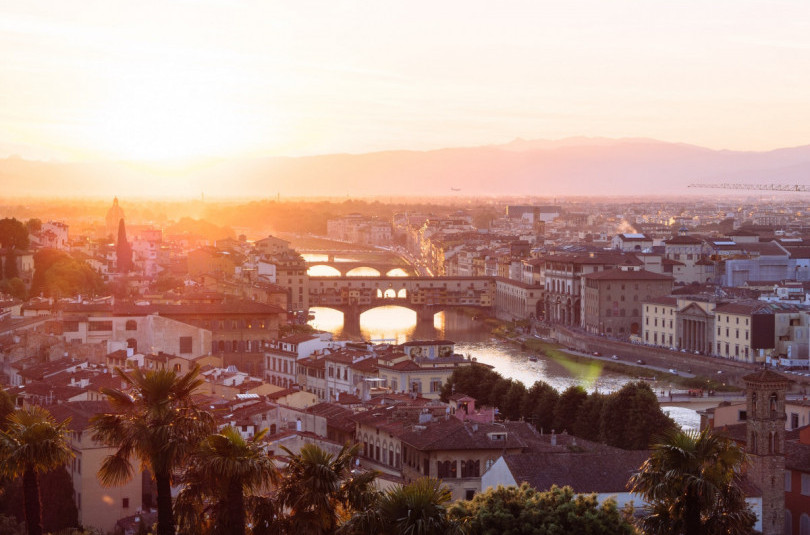Триест - столица региона Фриули-Венеция Джулия, морской порт на адриатическом море на границе со Словенией.
Город, заселённый еще с доисторических времён, пережил всплески и падения вместе с Римской империей, побывал под властью Византии и с конца 14го века был под защитой Австрии.
Город побывал и под немецкой и под югославской оккупацией, город впитал в себя культуру всех народов, побывавших здесь.
Газета The Financial Times опубликовала статью Джана Морриса (Jan Morris) о Триесте.
Писатель, живший в городе до 1954-го года (когда город перешёл из статуса "Свободной территории Триест" под управлением ООН к Италии) описал свое видение города, свою любовь к нему.
Город, где останавливаются, как правило, лишь ненадолго по пути в Хорватию, город, утративший своё былое значение после распада Австро-Венгрии.
Многое в городе напоминает о его значении как главного порта Габсбургов.
Но город интересен не для пляжного отдыха - город прекрасен осенью, когда можно спокойно расслабиться и насладиться природой.
Выпить кофе (Триест - родина и штаб квартира известнейшей фирмы Illy caffè по производству кофе), посидеть за столиками, где сидели многие писатели...
-----------------
Оригинал статьи :: //www.ft.com/cms/s/2/6f579ad4-b169-11df-b899-00144feabdc0.html
Late-summer sun
By Jan Morris and Joanne O’Connor
Published: August 27 2010 18:22 | Last updated: August 27 2010 18:22
If there is one city of the Mediterranean coast that is best visited in the autumn, it is surely Trieste, pre-eminently an autumnal city itself, writes Jan Morris. It is perpetually experiencing the autumn of its days, never having recovered the glory of its importance as the principal seaport of the Austro-Hungarian empire. Ever since the collapse of that imperium, and Trieste’s absorption into Italy, it has been a place whose allure is the allure of autumn, when the leaves are lying in the side-streets dreaming of sunnier times.
I love Trieste, and I love it largely because of its innate melancholy. It has its bathing beaches and its boulevards but it has never been a holiday resort, and most of its summer visitors spend only a day or two on their way to the coast of Croatia. In its great 19th-century days it was a powerful international seaport – in effect the port of Vienna and central Europe – and when the Habsburgs faded into history, they left behind, in a wistful kind of way, many mementos of their presence. Autumn is the time to enjoy them! Autumn, season of mists and mellow fruitfulness, when you can idle away the hours in the old Viennese cafés of Trieste, drinking some of the best coffee in Europe, chatting with some of the most amiable people, contemplating the great figures of European literature who have idled here before you.
Contemplating history too, for in Trieste the past is always alive. For me one of the great pleasures of travel, especially when summer is over, is to sit over my coffee (fairly well wrapped up) at the Caffe degli Specchi in the great Piazza Unita on the waterfront at Trieste. All around the square, children (also well wrapped up) are running around, playing football, pushing toy prams, laughing among the pompous civic architecture of the place, while their proud mammas keep careful eyes upon them from the café terrace. Then I can imagine, all too clearly, the great old steamships tied up at the quay, and the military band playing waltzes or stirring marches in the bandstand outside the governor’s palace, and James Joyce writing a poem at the next table, and some be-feathered imperial general, his sword propped up beside him, treating his aide de camp to a grappa while they prepare the order of the day’s parade.
Hardly a holiday, you may think? Not a holiday in the tabloid, travel agent, cut-rate airline sense, but a holiday out of the summer, a holiday in the maturing sun. And with any luck a wind will descend upon you as you sit there, first gently rustling the poet’s notebook, the aide’s order form, the pages of the children’s ABCs and the waiter’s pad, but then suddenly revealing itself in the full colossal majesty of the bora. You have not experienced Trieste until you have experienced the bora, especially in the autumn. It is a terrific blustering wind out of the north, fierce enough to topple trams or keep steamboats at their moorings, a phenomenon so absolutely of this city that it long ago became a municipal brag, joke and legend.
What a postcard you can send home then! The old British seaside cards would have done the bora proud, fat ladies holding their skirts down and the umbrellas blowing inside-out, and when you get home the funniest, truest and least boring of all your holiday stories will tell of when the bora almost blew you into the harbour, and sent you dripping, but exuberant back to your hotel, during your few autumnal hours in Trieste.
